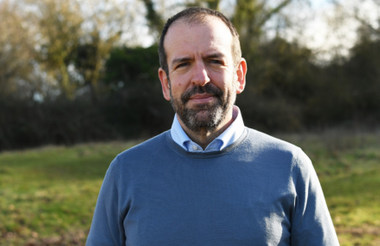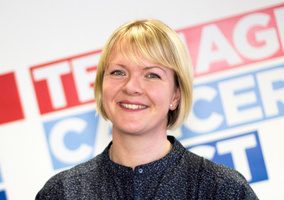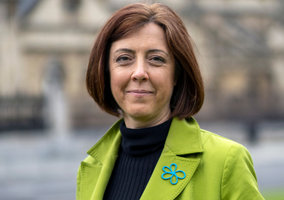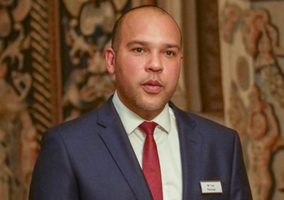Roger Mortlock started with CPRE in May of this year, joining from the Gloucestershire Wildlife Trust where was CEO for nine years. His charity roles followed an early career in the public sector including time in the health service.
Mortlock says he felt there was something about the flexibility in the charity sector to articulate new models for change that “really intrigued” him.
“It felt like the charity sector was a good place both to advocate for change, but also to come up with new ways of doing things.”
For the last 25 years or so, Mortlock has been working with the environment and in place-making.
“I have always been fascinated by people’s relationship with place and the environment, so that’s been a constant. This feels like a nice fit, because CPRE is very much about place.”
His first port of call in the role was with getting to know his team.
“Unless you can work coherently with the team you are leading, then you probably haven't got a hope in hell, so there's been a real focus on getting to understand the drivers, some of the history, the economic model of how things tick.
“Team first, and then the operating environment, to see where we fit in the wider ecology of the environment sector.”
The third part has been getting to know the 41 federated branches, “all with different flavours and different priorities, no federated structure is the same”.
‘The environment sector is way behind the curve on EDI’
Mortlock says the environment and agriculture sector are generally “way behind the curve” on equity, diversity and inclusion (EDI) issues compared to other industries he has worked in such as health and the arts.
At CPRE, Morlock says he wants to see a “powerful shift” in how the charity communicates about place making and what access to the countryside looks like.
“One of the great things about CPRE for me has been how passionate the staff are around this issue. There is already enthusiasm around the staff to get this right,” he says.
“What we do, whether that’s about affordable housing, whether that’s about how people access the countryside or the green belt, how they create better green spaces close to where they live, they are diversity and inclusion issues.
“We have got to look at EDI through the lens not only about how we run the organisation, but also about what we do in the world.”
“It’s almost operationalising EDI into our work, so it’s not just a policy we sign up to, it is also about how we take it forward into the world.”
Attracting younger members
Mortlock says growing the charity’s membership and major donors are two areas that the charity plans to grow over the next year.
Members of the public who become members of CPRE join the national charity as well as the branch closest to them. Mortlock says attracting more younger members is a particular target.
“People recognise that there are massive threats to rural England, from climate change, development, those threats are pretty high up the agenda for people, whether they are living in rural parts of the country, or whether they are visiting – half of our members are urban livers, which is sometimes surprising to people.
“There is a really important piece of work we need to do that includes the youth voice in CPRE. All of us recognise that CPRE has an ageing membership, and an ageing volunteer base, and there are some really great examples where we have got branches which are bucking the trend on that.”
For example, in Hereford there were 500 volunteers recruited in the last year to monitor water quality in the Wye.
“There is an urgency for us to capture young people’s views, in carving out our future. We are 100 in two years’ time which is a mighty milestone, but we need to be framing the future of the countryside with the younger people who will inherit it.
“There are lots of young people who are part of grassroots-up organisations which are about improving the quality of the place they live in, or are saving green spaces, or campaigning for improving water quality. I am not sure those people are looking to be members of CPRE, but I think there is a common cause with them. We need to be generous in extending to that wider movement of people who care about the countryside and want to protect it.”
Diversifying income
Mortlock says the charity has impacted the charity, with “increased competition for diminishing funding sources”.
He says there are some particular issues around the way the cost-of-living crisis impacts on things like transport, the costs of housing, fuel bills, in rural England, in ways that might be different in cities.
“The cost-of-living crisis impacts us as we rely very heavily on supporters and donations. We have seen the beginning of a squeeze on appeals, and it is very difficult to judge in these early days whether that is about what the appeal was about, or the cost-of-living crisis. We are keeping a regular eye on sector data to see where we are against that.
“We have a very healthy legacy income which is less affected by the cost-of-living crisis but also erratic, so we are looking to build up and diversify some income streams – and it’s probably not the greatest time to do that, but I still think we have to put some energy behind them.”
‘We need to find increasingly broad ways into volunteering’
Mortlock will also be focusing on how to draw in more volunteers to the charity.
“We need, especially since Covid, to find increasingly broad ways into volunteering.
“There is a core in most branches of volunteers, who do some amazing work. Really skilled volunteers who look at planning applications and get very involved in the detail of what is happening.
“We have also done some big scale engagement projects, like on hedgerows for the Coronation we did this great hedge-live help out as part of the Big Help Out, where we encouraged people to do surveys of the hedges around them. We have also done this star camp, which is to support our dark skies and tranquillity mapping work.
“We need to match what people want to do with the offer that we have, and for some people I hope pouring over planning applications will be something they still want to put their energies into, and there are many more people out there who we should be capturing.”
‘More political interest in the environment than there has ever been’
Ahead of the next general election, Mortlock says CPRE will be focused on articulating solutions to the country’s environmental planning issues “alongside calling out the bad”.
“There is a danger when you are working in land use, planning, and place making, that there is so much to object to – the hall of shame is so long – but actually you need to be able to articulate what good looks like.”
Mortlock says influencing will be a big focus ahead of the next election, “getting our manifesto started, thinking about what we do in coalition with others, what’s in our own calls for the next government”.
“It feels like it’s an era defining election, whatever the result. It feels like there is a shift in terms of what's happening in a lot of rural constituencies as well, so it is not a political point to say that it is going to be a big election – it is important for us as champions for the countryside to set our stall about where we think the most critical issues are.
“Issues like affordable rural housing, reimagining the green belt, and areas around towns and cities where most people get their day-to-day exposure to the countryside next door, thinking about how we tackle the energy and climate crisis – those things we need to think about carefully. There is more political interest in the environment than there has ever been, so that is to build on.
“We have got to work hard to make sure that we make those arguments. The cost-of-living crisis and the climate crisis are absolutely intertwined. They are not separable things. We need to take a more holistic view and demonstrate the financial and the economic benefits of creating a vibrant countryside.”
‘So much of what we do now we do in coalition’
Mortlock says campaigning is at the heart of CPRE, which he describes as “a campaigning organisation”.
On the rules around charities and campaigning, Mortlock says: “I think the rules are pretty simple, and I think they give us quite a lot of flexibility to be advocates, in our case for the countryside, with some energy across the political spectrum.
“I don’t think we have changed our perspective on that, we talk passionately about the countryside across the political spectrum, and we can champion good ideas where they come from across the political spectrum, and we can criticise bad ideas from across the political spectrum.”
He says “attacks on nature” in recent years have had an upside in terms of “how unified the environment sector became”.
“That was not always the case. When I started my career, I think there was much less unity. So much of what we do now we do in coalition.
“You need to think about campaigning ‘what can we only do on our own, where is our core bit, where it makes sense for us to champion it on our own, and where does it make sense to do some of this together with other people’, either bilaterally on in a wider coalition.
“There’s lots more noise out there but I think it is also much more coordinated, and all power to that.”
Related Articles












